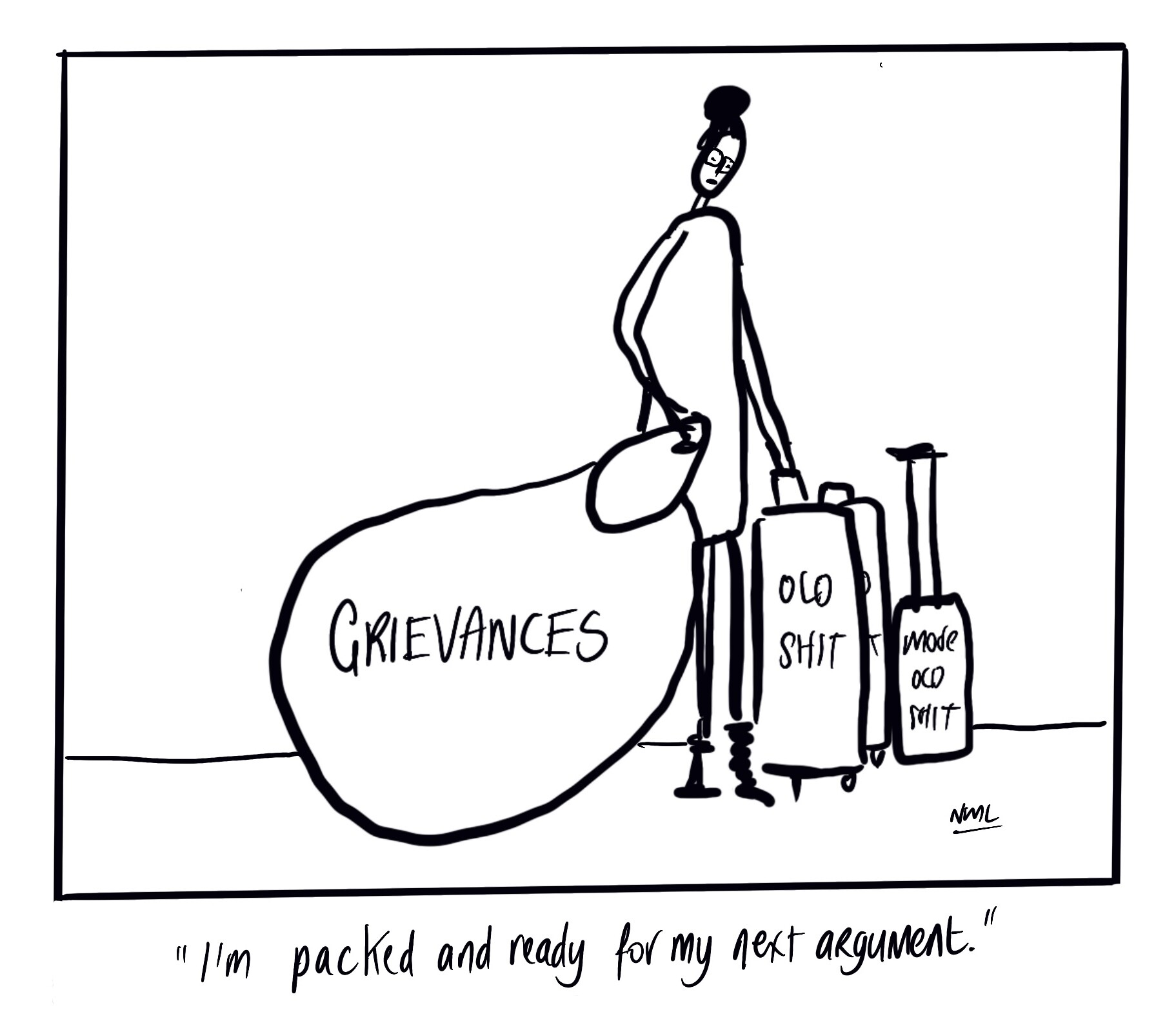Circular disagreements and why we need to stop hoarding our resentments
Thanks to Marie Kondo, getting rid of everything we don't really need or that doesn't "spark joy" is something millions of people have tried. Most of us are uncomfortable with the idea of being a hoarder. It conjures up all sorts of images. Yet we don't pay enough attention to the resentments, including the grudges, that we carry with us from argument to argument.
These are circular disagreements: resurrecting old grievances by throwing them into the bonfire of a new argument.
We go around in circles because we keep breathing new life into a problem. It's not just that we find ways to talk about it or hint at our unhappiness; we ruminate, making us simmer and fan the flames of grievances.
Why do we keep old disagreements, almost saving them to drag into our next conflict?Although we are essentially on the same team in our intimate relationships, conflict speaks to a part of us that adopts an eat or be eaten mentality. We want to win, be right, and feel like the “least at fault” or the wronged party. Unfortunately, that means we're "advocating" and sometimes dragging everything but the kitchen sink to thwart our opponent and win "the deal."
The problem, of course, is that they are our relatives, not our enemies. After all, with people with whom we fear loss of reputation or instances where we know it would be rude or petty to bring up the past, we not do so. This is why we tend to resist engaging in circular disagreements at work. We do our best to stick to the issue at hand, even if it's with gritted teeth.
With circular disagreements, we ignore the relevance to the current problem or even its age and seemingly previous resolution. It's all about evidence. "Look! Here is proof that you have no idea!" Or, "Let me walk you through the A to Z piece of this huge mistake . You haven't paid enough yet." Or, "If you're going to point out my old mistake, come back to it!"
Most disagreements drag on, not because we try to understand each other's point of view or find a solution, but because we argue about how we get along. let's argue. When we resurrect a circular disagreement, they retaliate. Or, we perceive them pointing out the injustice or immaturity of our argument as retaliation. And we turn around.
While bringing up old things might underscore or reinforce our present point of view, it does cause more conflict.It hurts our position (causing greater defensiveness) and alienates our loved ones. If we consider our goal to be winning, being right, etc., someone must be the loser, the wrongdoer, the most culprit, or the doer. Good for battles and courtrooms, but not so good for our intimate and love relationships.
A universal principle applies to all conflict in intimate relationships: it's not about who is right, but what is good for the relationship.
Does too often, circular disagreements hinder the growth of our relationship. They can damage trust and create a reluctance to bring up issues, admit mistakes, and let things go. After all, if something keeps happening, why try to change it? Why try to troubleshoot?
For better or for worse, our habits of conflict management and resolution are our attempts at self-protection. When we approach or avoid conflict in ineffective and unhealthy ways, these mindsets, attitudes and behaviors are manifestations of our emotional baggage.
Leave the arguments where we left them.Accept it's "done" when the disagreement ends. Either we must admit that we have not fully expressed ourselves and that we have not found a solution to start a constructive discussion. These options are much better than drip cues about our displeasure or resentment about something. Being ready to park arguments is vulnerability in action. We must not only feel our feelings and be honest with ourselves, but also extend...

Thanks to Marie Kondo, getting rid of everything we don't really need or that doesn't "spark joy" is something millions of people have tried. Most of us are uncomfortable with the idea of being a hoarder. It conjures up all sorts of images. Yet we don't pay enough attention to the resentments, including the grudges, that we carry with us from argument to argument.
These are circular disagreements: resurrecting old grievances by throwing them into the bonfire of a new argument.
We go around in circles because we keep breathing new life into a problem. It's not just that we find ways to talk about it or hint at our unhappiness; we ruminate, making us simmer and fan the flames of grievances.
Why do we keep old disagreements, almost saving them to drag into our next conflict?Although we are essentially on the same team in our intimate relationships, conflict speaks to a part of us that adopts an eat or be eaten mentality. We want to win, be right, and feel like the “least at fault” or the wronged party. Unfortunately, that means we're "advocating" and sometimes dragging everything but the kitchen sink to thwart our opponent and win "the deal."
The problem, of course, is that they are our relatives, not our enemies. After all, with people with whom we fear loss of reputation or instances where we know it would be rude or petty to bring up the past, we not do so. This is why we tend to resist engaging in circular disagreements at work. We do our best to stick to the issue at hand, even if it's with gritted teeth.
With circular disagreements, we ignore the relevance to the current problem or even its age and seemingly previous resolution. It's all about evidence. "Look! Here is proof that you have no idea!" Or, "Let me walk you through the A to Z piece of this huge mistake . You haven't paid enough yet." Or, "If you're going to point out my old mistake, come back to it!"
Most disagreements drag on, not because we try to understand each other's point of view or find a solution, but because we argue about how we get along. let's argue. When we resurrect a circular disagreement, they retaliate. Or, we perceive them pointing out the injustice or immaturity of our argument as retaliation. And we turn around.
While bringing up old things might underscore or reinforce our present point of view, it does cause more conflict.It hurts our position (causing greater defensiveness) and alienates our loved ones. If we consider our goal to be winning, being right, etc., someone must be the loser, the wrongdoer, the most culprit, or the doer. Good for battles and courtrooms, but not so good for our intimate and love relationships.
A universal principle applies to all conflict in intimate relationships: it's not about who is right, but what is good for the relationship.
Does too often, circular disagreements hinder the growth of our relationship. They can damage trust and create a reluctance to bring up issues, admit mistakes, and let things go. After all, if something keeps happening, why try to change it? Why try to troubleshoot?
For better or for worse, our habits of conflict management and resolution are our attempts at self-protection. When we approach or avoid conflict in ineffective and unhealthy ways, these mindsets, attitudes and behaviors are manifestations of our emotional baggage.
Leave the arguments where we left them.Accept it's "done" when the disagreement ends. Either we must admit that we have not fully expressed ourselves and that we have not found a solution to start a constructive discussion. These options are much better than drip cues about our displeasure or resentment about something. Being ready to park arguments is vulnerability in action. We must not only feel our feelings and be honest with ourselves, but also extend...
What's Your Reaction?















![Three of ID's top PR executives quit ad firm Powerhouse [EXCLUSIVE]](https://variety.com/wp-content/uploads/2023/02/ID-PR-Logo.jpg?#)







